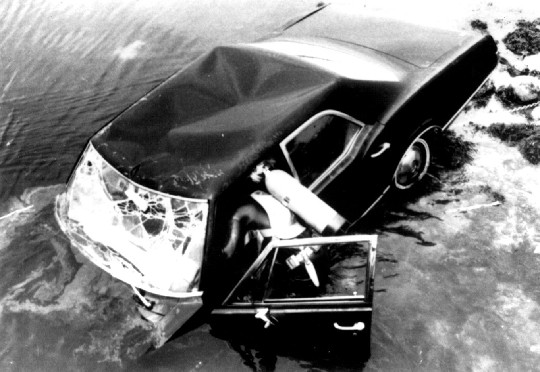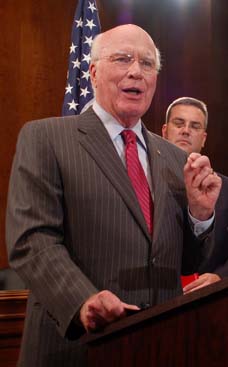
"There was going to be a Chappaquiddick," says Laurence Leamer, the author of three bestselling books on the Kennedy clan. "There was going to be some horrible event that he was thrust into." For much of his life, Mr. Kennedy kept company with powerful and ambitious men who saw the Massachusetts senator as their vehicle back to the White House, for which he was probably not suited. "He had an immensely troubled life," Mr. Leamer said in an interview. "He was surrounded by people who were trying to make him something he wasn't." According to Mr. Leamer, plans are already well advanced for his funeral. Forty years after his car went off the bridge, his body failing, we can look back on Ted Kennedy's life with greater admiration and respect than we often felt during it. "He was the last and least of the brothers," Mr. Leamer observes. "He was the one who was almost an embarrassment. Yet history may see him as having the greatest legacy of them all."
"There was going to be a Chappaquiddick," says Laurence Leamer about Ted Kennedy "There was going to be some horrible event that he was thrust into."
The other president
After a scandal-plagued past, the senator's legacy of reforms rivals that of most men who have occupied the Oval Office
John Ibbitson
Caption: A diver helps raise Senator Edward Kennedy's car out of the water eight hours after the accident in which Mary Jo Kopechne was killed on July 18, 1969. At the time the car was pulled from the water, Mr. Kennedy hadn't yet told police of the accident.
Washington - From Saturday's Globe and Mail Last updated on Thursday, Jul. 23, 2009 09:01AM EDT
Forty years ago today, Edward Kennedy drove a car off a bridge on Chappaquiddick Island, an accident that cost Mary Jo Kopechne her life and that may have kept him from the White House. Which might have proved a blessing.
"There was going to be a Chappaquiddick," says Laurence Leamer, the author of three bestselling books on the Kennedy clan. "There was going to be some horrible event that he was thrust into."
For much of his life, Mr. Kennedy kept company with powerful and ambitious men who saw the Massachusetts senator as their vehicle back to the White House, for which he was probably not suited.
"He had an immensely troubled life," Mr. Leamer said in an interview. "He was surrounded by people who were trying to make him something he wasn't."
Yet Ted Kennedy ultimately evolved into what many believe is the finest senator in the history of the chamber: the author, in a career spanning 46 years and nine presidents, of landmark reforms in health care, education, immigration, workers' rights and foreign policy.
"His accomplishments are not only extraordinary in the history of the Senate, they outmatch the accomplishments of just about any of the great presidents," believes Jim Young, director of the Kennedy Oral History Project at the University of Virginia's Miller Center of Public Affairs.
During the long years of Republican rule, Mr. Young believes, Mr. Kennedy served as "the other president" with "a national constituency in opposition to, as well as in support of the president."
Today, at 77, Mr. Kennedy is fighting brain cancer. He suffered a seizure at President Barack Obama's inauguration, and has not been seen on Capitol Hill since April. Friends and family say he has good days and bad days. There are unconfirmed reports that he is losing memory and, at times, lucidity.
According to Mr. Leamer, plans are already well advanced for his funeral.
Forty years after his car went off the bridge, his body failing, we can look back on Ted Kennedy's life with greater admiration and respect than we often felt during it.
"He was the last and least of the brothers," Mr. Leamer observes. "He was the one who was almost an embarrassment. Yet history may see him as having the greatest legacy of them all."
A diver helps raise Senator Edward Kennedy's car out of the water eight hours after the accident in which Mary Jo Kopechne was killed on July 18, 1969. At the time the car was pulled from the water, Mr. Kennedy hadn't yet told police of the accident.
A true Kennedy
He is a Kennedy, part of a hard-driving, high-living dynasty whose public prominence and relentless recklessness produced generations of scandal and untimely deaths.
Few spoons were of purer silver than the one Teddy Kennedy had in his mouth when he was born. Joseph Kennedy's youngest boy spent his childhood shuttling from Hyannis Port, Mass., to Palm Beach, Fla., to the Court of St. James.
He received his first communion from the Pope. Harvard expelled him for cheating, then welcomed him back. Cardinal Francis Spellman officiated at his first wedding. His brother John made sure he could inherit the president's old Senate seat just as soon as he turned 30.
Yet his life has been scarred by tragedy. The assassination of two brothers. The amputation of one son's leg; the treatment of another for drug addiction. The 1964 airplane crash that left him with an injured back that plagues him to this day. His first wife's alcoholism. His own.
"Say what you want, he's an alcoholic," Mr. Leamer believes. "He's an alcoholic who, no matter what he drinks, can get up the next morning and go to work. And he used the alcohol and sex and all kinds of diversions to get him away from the realities of his life."
And then there was the party, the car ride, the turn down a darkened lane, the car plunging into the water, the panicked senator avoiding police, offering explanations that rang as hollow then as they do today.
Edward Klein is the author of Ted Kennedy: The Dream That Never Died , a new biography. He does not believe Chappaquiddick kept Mr. Kennedy from becoming president, noting that it played little part in Mr. Kennedy's unsuccessful attempt in 1980 to take the nomination away from the sitting president, Jimmy Carter.
Rather, the campaign was undermined by its own disorganization and by Mr. Kennedy's inability to explain why he wanted to become president.
For Mr. Klein, this speaks to deeper conflicts.
"In his heart of hearts, he never thought he deserved to become president of the United States," he says.
"There was a psychological barrier within him. … He simply could not vault over the hierarchical order that had been established in his family and outshine at least two if not three of his brothers." Joe, the oldest brother, was killed in the Second World War.
Senator Edward Kennedy is escorted by troopers as he leaves the courthouse in Edgartown, Mass. after pleading guilty to the charge of leaving the scene of an accident in this July 25, 1969 photo. Mary Jo Kopechne drowned after a car driven by Mr. Kennedy plunged off a bridge in Chappaquiddick, Ma.
His struggle to become something that he didn't actually want to be could account for Mr. Kennedy's Jekyll and Hyde years, when his many accomplishments in the Senate contrasted with his alcohol-fuelled womanizing.
There were repeated scandals, year after year, humiliating pictures, a midlife crisis so epic that it turned the senator into a buffoon.
"It was an expression of his self-loathing, to a large degree." Mr. Klein contends. "Because he constantly got caught."
Marriage to his second wife, Victoria Reggie, in 1992, stabilized his private life. The baddest of the Kennedy bad boys evolved into paterfamilias. And through it all, Mr. Kennedy had been mastering the art of dominating the Senate.
A Senate lion
Ted Kennedy has the largest office on the Hill, with more than 100 people on his staff, "comparable in quality and scope to a president's White House," Mr. Young believes.
He had a knack for knowing what was doable, when a majority might exist and when it wouldn't. He happily reached across the aisle in search of bipartisan coalitions, and would rewrite bills from stem to stern to achieve those coalitions, to the anguish of idealists.
Mr. Klein observes that Mr. Kennedy is an old-fashioned, New Deal liberal, which would not have resonated in a presidential election in the age of Reagan, "whereas he could operate from that position much more easily in the Senate."
And there was his smile, his laugh, his backslap.
"He was the genial Irish pol," Mr. Leamer says. "He genuinely likes people, and a lot of politicians don't."
It led to decades of landmark legislation that he sponsored or brokered in the Senate: an end to race-based immigration quotas; family leave for medical emergencies and after childbirth; campaign finance reform; quadrupling the funding for cancer research; prohibiting employment discrimination against the disabled; mandating equal funding for women's athletics; extending health care to children whose parents can't afford insurance; the No Child Left Behind education reform; increasing the minimum wage; funding for AIDS research; imposing sanctions on South Africa over Ronald Reagan's veto.
A couple of years ago, during a tribute to him in the Senate, he joked: "People ask me how long I will continue to serve in the Senate. I give the same response, that is: I am going to stay here until I get the hang of it."
At the 1980 Democratic National Convention, in his concession speech, Edward Kennedy uttered the sentence that became an anthem for liberals during the Republican decades.
"The work goes on, the cause endures, the hope still lives, and the dream shall never die."
The work will go on without Ted Kennedy. That's what he was saying, when he endorsed Barack Obama for president. His generation is passing from the scene. But there is no one, as yet, in the rising generation as deft as he at both embracing visions and brokering deals.
His absence, as the Senate struggles to enact major health reform, is keenly felt.
"We're just beginning to realize how much he will be missed," Mr. Leamer believes. "There is no one coming forward with anything like his qualities or abilities."
The Lion of the Senate, they call him. And maybe the last one. And perhaps, when he's gone, the ghosts of Chappaquiddick will finally be laid to rest.













